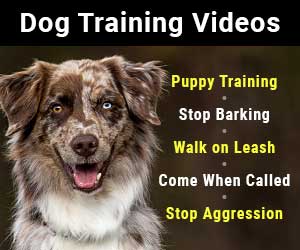
Make Your Dog Training Commands Clearly Understood
I remember when I was a kid; before the days of the internet, video games, and smartphones. I would go outside and play with friends in the area. We didn't have little devices on us so we could be in constant contact with home. That was still something that only happened on "Star Trek." So, we usually didn't stray too far and were supposed to be in range of our parent's call.
"Maaaark! Maaaark!" It was my friend's mom. "I gotta go, it's supper time."
We understood that when our name was called it meant to come home. Our dogs may not make that direct connection. How many times have we been calling our dogs, "Levi, Levi, Leeeevi!" and they just look at us and go back to what they were doing. And why shouldn't they. We were just saying their name after all.
If we say their name when we actually mean "come," or "no," or "sit" we can't blame them for not understanding and not responding the way we expected them to. How clear are your commands—are you even using the correct commands?
Humans use verbal language all the time and it flows out of us naturally, sometimes too much. What might seem like a simple, straightforward statement will work when talking to another person but miss the mark completely when spoken to a dog. We understand subtlety, nuance, and context.

melounix / stock.adobe.com
When dog training, commands should be clear, consistent, and concise. For success, both you and your dog need to be on the same page.
Dog Obedience Commands Need To Be Consistent
It's important to pick a command and stick with it. You also need to make sure everyone in your household is on the same page. With my dog, Levi, I would use the commands "sit," and "down." He would even do push-ups; "sit, down, sit, down, sit, down…" Up and down he would go. He was great at it!
Then my wife mentioned that Levi never listens to her. He doesn't even sit! "What are you talking about? He's a pro!" I said. But she was adamant. "He just lays down and ignores me." What?! This didn't make sense to me.
"Levi! Come!" He trotted into the living room. I asked my wife to get him to sit. She gave him the command, "Levi, sit down." He laid down on the carpet. "Up." He stood back up again. "Sit down." He did not sit, he just laid on the carpet again.
Of course, the problem was not with Levi it was with us. We were giving different commands. She used the phrase "sit down," while for me "sit" and "down" were two completely different commands. So when he heard my wife tell him to "sit down" he was hearing two commands in such fast succession that he just went with the last one he heard and did what he thought was right by following the "down" part of "sit down."
And what if your dog jumps up onto the bed and you tell them to "get down." Instead they just plop down on the bed and make themselves comfortable. Are they being defiant and refusing to get off the bed, or are they just doing what you told them to do? After all, you told them to "get down" and as far as they are concerned they followed your command "down" perfectly. They might not understand why you are now getting all huffy about it and trying to push them off the bed.
While using the wrong command can confuse your dog, using the correct command repeatedly can result in your dog ignoring the command altogether.
With Dog Training Commands—Less Is More
How many times have you heard a dog owner yelling "come," "come," "come," "come here," "come here now," "coooome!"? You want to tune them out just like their dog already has.
The optimal number of times to give a command is… once. If you do not train your dog to sit when you say "sit" once, and instead you say "sit, sit, sit" or worse, start getting louder and say "sit, sit, SIT, SIT!" you are training them to only obey once they have heard it three, or four, or ten times. Or they learn that it doesn't mean much of anything and they can just ignore it, at least until you say it really, really loudly.
Whether your dog listens the first time or makes you repeat yourself over and over it is because that is what you have trained them to do. That's why it's important to stay in the habit of only giving commands once and rewarding for the desired behavior. There should be no treats or rewards otherwise.
Commands Shouldn't Have To Be Yelled
You don't want to have to raise your voice when giving dog training commands. If you are yelling, it is because you are not in charge. Dominant dogs are not usually the ones barking like crazy; the fearful, nervous, and over-excited ones are. In fact, you should be more worried about a rigid dog with an almost inaudible growl than you should be with one that is running about and barking up a storm.
I remember once we got a new CEO at a company I worked at. He had a meeting with staff to introduce himself to everyone and address concerns. He had a reputation of being a very demanding boss and he actually discussed his management style to counter rumors that he was a raging bully that screamed at employees. I remember him saying "I'm the boss; I don't have to yell."
It wasn't about fear or intimidation either. He was very competent and commanded genuine respect. Indeed, he did not have to yell or repeat himself incessantly and neither should you when communicating with your dog.
Have Dog Training Questions?
Check out these introductory dog training videos...
I want my dog to stop being aggressive.
I want some help training my new puppy.
I want my dog to stop barking at everything.
Get Australian Shepherd Info, Website Updates, Special Offers, and Cartoons...
FREE GIFT
You'll also receive a free copy of the ebook
My Everyday Dog Training Tools
by professional dog trainer Daniel Abdelnoor, "Doggy Dan"











 Loading Image...
Loading Image...